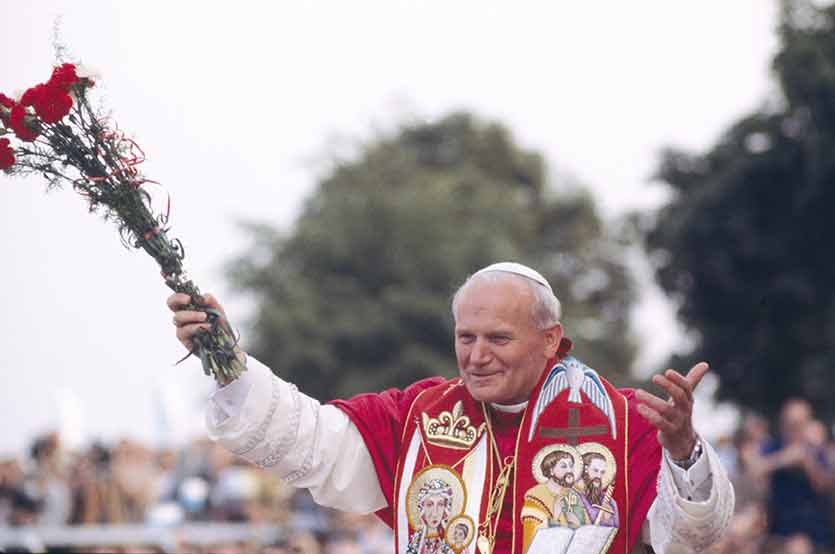Thirty years have passed since Pope St. John Paul II initiated World Youth Days. Karol Wojtyła died in April 2005 and it is possible that, eleven years later, many of the young people who will attend the XXXI WYD in Krakow in July are already unaware of his extraordinary figure. These pages help to get to know his intellectual legacy, centered on the value of the person, of love and of the body.
– Juan Manuel Burgos
The thought of Karol Wojtyła/John Paul II as a philosopher, theologian and poet is both extensive and profound. He offers contributions on a wide variety of issues: from women (Mulieris dignitatem y Letter to women) to his nation, Poland, or the homeland. He understood, for example, that society should be founded on participation and not on alienation, and that the system-prójimo should take precedence over the system-community; he defended at the United Nations his vision of human rights and international relations; and he considered the family to be "communio personarum".
Here, as a matter of space, we will deal only with his most fundamental contributions and those to which he devoted more space in his writings.
From poetry to philosophy
But in order to be able to interpret and value his thought, it is necessary to know first his interesting intellectual history. And that history begins with poetry. In fact, his first text published, under a pseudonym, is the poem On your white grave: "Over your white tomb/ mother, my love extinguished, / a prayer from my filial love: / give her eternal rest."
The young Wojtyła mourns his dead mother while beginning his studies in Polish philology at the Jagiellonian University in Krakow. His literary and artistic vocation was so strong that he continued to write poetry until his death (Roman triptych), but, above all, the call to the priesthood prevailed in the context of a Poland occupied by Nazi troops. It was thus that he came into contact with philosophy and, more specifically, with Thomism. "At the beginning it was the great obstacle. My literary training, centered on the human sciences, had not prepared me at all for the theses and scholastic formulas that the manual proposed to me, from the first to the last page. I had to make my way through a thick jungle of concepts, analyses and axioms, without even being able to identify the ground I was treading on. After two months of clearing vegetation, the light came and the discovery of the deep reasons for that which I had not yet experienced or intuited reached me. When I passed the exam, I told the examiner that, in my opinion, the new vision of the world that I had conquered in that melee with my manual of metaphysics was more precious than the grade obtained. And I was not exaggerating. What intuition and sensibility had taught me about the world until then, had been solidly corroborated" (Do not be afraid, André Frossard, pp. 15-16).
Wojtyła consolidated his training as a Thomistic philosopher (and theologian) at the. Angelicum He was invited to do a thesis on St. John of the Cross, another of his great sources of inspiration. But when he returned to Krakow, something relevant happened: he was asked to write his habilitation thesis on the phenomenologist Max Scheler, then very fashionable. It so happened that Scheler, although a disciple of Husserl - and, therefore, framed himself in modern philosophy (far removed from Thomism) - proposed an ethics that seemed to have many points of contact with Christianity. Wojtyła decided to analyze this question, which proved decisive in his intellectual evolution. "I truly owe a lot to this research work. [the thesis on Scheler].. The phenomenological method was thus grafted onto my previous Aristotelian-Thomistic training, which has allowed me to undertake numerous creative essays in this field. I am thinking in particular of the book Person and action. In this way I have been introduced to the contemporary current of philosophical personalism, the study of which has had repercussions on the pastoral fruits" (Gift and Mystery, p. 110). The study of Scheler, in fact, put him in contact with contemporary philosophy, showing him that it possessed valuable elements that should be integrated into it, and that the best way to achieve this was philosophical personalism.
When Karol Wojtyła formulates this conviction, his path of intellectual formation is over. From here he will begin his own itinerary with a very precise starting point: the person.
Juan Manuel Burgos is a full professor at the CEU - San Pablo University.








